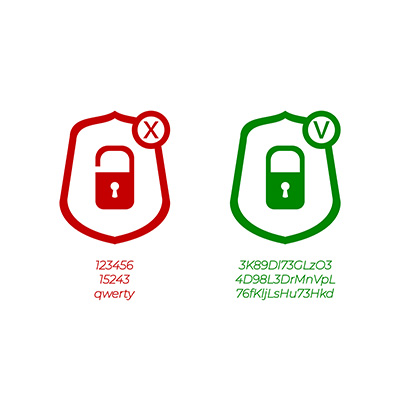There was a time when passwords were a novelty and going for something obvious and memorable seemed perfectly okay. We’re thinking of passwords like Password, 123456, qwerty or Guest. Those days have gone. It’s about password hygiene practices. If you don’t want to experience a data breach you need to wise up on what makes a strong password that will keep unauthorized persons out of your accounts and files.
Let’s take a look at where we are with passwords now, and what effective and ineffective passwords look like.
Bad Passwords
Let’s just preface that discussion by saying that passwords are a fairly primitive form of account protection, although they’re better than no protection at all. They’re still popular and in general usage, but they’re not the secure padlock on the door that some might think.
A lot of passwords are bad, because it’s not something we’ve been accustomed to putting much time and effort into. Bad password practices are rife. The most common problems are passwords that are too simple or too easy to discover with a few guesses. For ease of recall, a lot of people used to use the same password for multiple accounts. That means that if someone has the password for one account, they can get into all of the others too. Obviously, this is a really bad idea.
Good Passwords
It’s not hard to create good passwords, so here’s how…
Don’t Reuse Passwords
We’ve already mentioned this, but it’s well worth repeating. It just needs one successful phishing attack or data breach and hackers have the keys to most of the rooms in the house. Passwords need to be both different and complex.
Complex Password Creation
Ideally, a complex password is hard to guess but also easy for you to remember. This can be a challenge. One way to keep your passwords memorable while enhancing their complexity is to use passphrases made up of random word strings, rather than passwords. Include upper-and lower-case letters, symbols and numbers to make guessing them more difficult.
Avoid Personal Information
There are two reasons to do this. Some of your personal info may be identifiable (online and on social media, for example), which can give hackers ideas about your password choices. Don’t make it easier for them!
Let a Password Manager Do the Work For You
The problem with complex passwords is that the more complex they are, the harder they can be to remember. With a password manager you only need one master password to access all your other passwords, which are encrypted and securely stored. They can also help you to generate strong passwords for your accounts.
Are You Keeping Your Data Safe?
Passwords are just one aspect of securing your accounts and infrastructure. Quikteks can help you stay ahead of the cybercriminals. For more information, call us at 973882-4644.

